The Overlooked Need for Mental Health Monitoring in Senior Wellness

Understanding the Significance of Mental Well-being in Seniors
As the global population ages rapidly, the importance of mental health monitoring in senior wellness is increasingly recognized. Despite being a vital component of overall health, mental health often remains overlooked in elderly care. Addressing this gap is essential to improve life quality, reduce disabilities, and promote healthy aging. This article explores the prevalence of mental health issues among older adults, examines strategies for early detection and intervention, and highlights innovative resources and practices to support senior mental well-being.
Common Mental Health Challenges in Older Adults
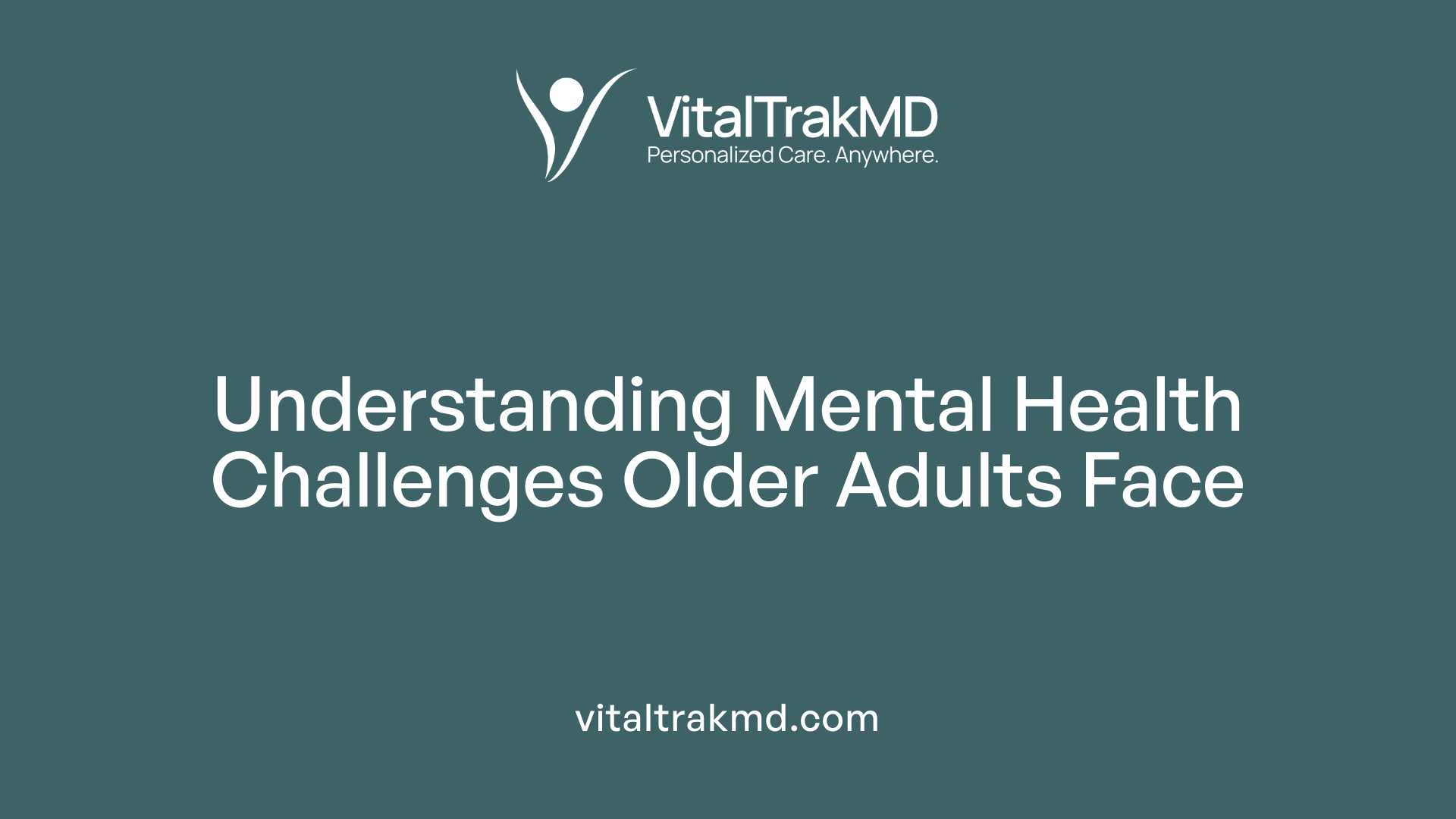
What are the common mental health issues affecting seniors, such as depression and emotional changes?
Older adults frequently experience mental health conditions like depression and anxiety. Depression is one of the most common disorders among seniors, often presenting as persistent sadness, a lack of interest in hobbies and daily activities, fatigue, sleep disturbances, and feelings of hopelessness. Unlike typical younger populations, older adults may also exhibit physical symptoms such as aches and pains, or cognitive difficulties that can be mistaken for normal aging.
Anxiety disorders are also prevalent, manifesting as excessive worry, agitation, restlessness, muscle tension, and sleep problems. Behavioral changes, including withdrawal from social activities and diminished participation in routine tasks, further characterize these conditions.
In addition to these mood disorders, seniors are at risk for cognitive impairments such as dementia and Alzheimer’s disease, which often involve memory loss, disorientation, and behavioral changes. These mental health issues not only influence emotional well-being but also impact physical health, functional status, and overall quality of life.
How do symptoms of depression and emotional changes manifest in older adults?
Depression symptoms in seniors can be subtle and often differ from younger individuals. Common signs include irritability, fatigue, loss of interest in enjoyable activities, changes in sleep patterns, and appetite alterations. Some older adults may also experience physical complaints like headaches or aches, which are linked to underlying depression.
Emotional changes might involve increased anxiety, agitation, or social withdrawal. Cognitive symptoms, such as forgetfulness or confusion, can be early indicators of depression or related cognitive decline, often requiring careful evaluation.
Recognizing these signs early is critical because depression in older adults significantly affects mood, energy, and overall health. Depression symptoms can sometimes be mistaken for normal aging or physical illnesses, leading to underdiagnosis.
What is the impact of social factors like loneliness and ageism?
Social determinants play a crucial role in the mental health of older adults. Feelings of loneliness and social isolation are widespread, affecting roughly a quarter of seniors, and are strongly linked to increased risks for depression, anxiety, and cognitive decline.
Loneliness can stem from factors such as mobility limitations, loss of loved ones, or reduced community engagement. These feelings not only diminish emotional well-being but are also associated with physical health issues like cardiovascular disease.
Ageism, encompassing negative stereotypes and discrimination based on age, exacerbates mental health problems by fostering feelings of worthlessness and social exclusion. Many seniors encounter misinformation about aging or face stigmatization when seeking mental health care, which can hinder early diagnosis and treatment.
Efforts to enhance mental wellness in older adults include promoting positive aging narratives, encouraging social participation, and implementing community programs that reduce stigma and foster social support. Such initiatives can mitigate the adverse effects of loneliness and ageism, ultimately improving mental health outcomes.
| Aspect | Description | Additional Notes |
|---|---|---|
| Prevalent conditions | Depression, anxiety, cognitive decline | Common in senior populations, often underdiagnosed |
| Symptoms | Sadness, irritability, social withdrawal, physical aches | Different presentation compared to younger people |
| Social influences | Loneliness, ageism, social isolation | Major risk factors impacting mental health |
| Treatment challenges | Underdiagnosis, stigma, misattribution to aging | Need for awareness, education, and integrated care |
| Intervention strategies | Social engagement, education, therapy, supportive environments | Effective in reducing depressive and anxious symptoms |
Understanding these mental health challenges and their social determinants underscores the importance of tailored, combination approaches to care. Improving detection, reducing stigma, and fostering social inclusion can significantly enhance mental wellness among older adults.
Why Mental Health Monitoring is Critical for Aging Populations
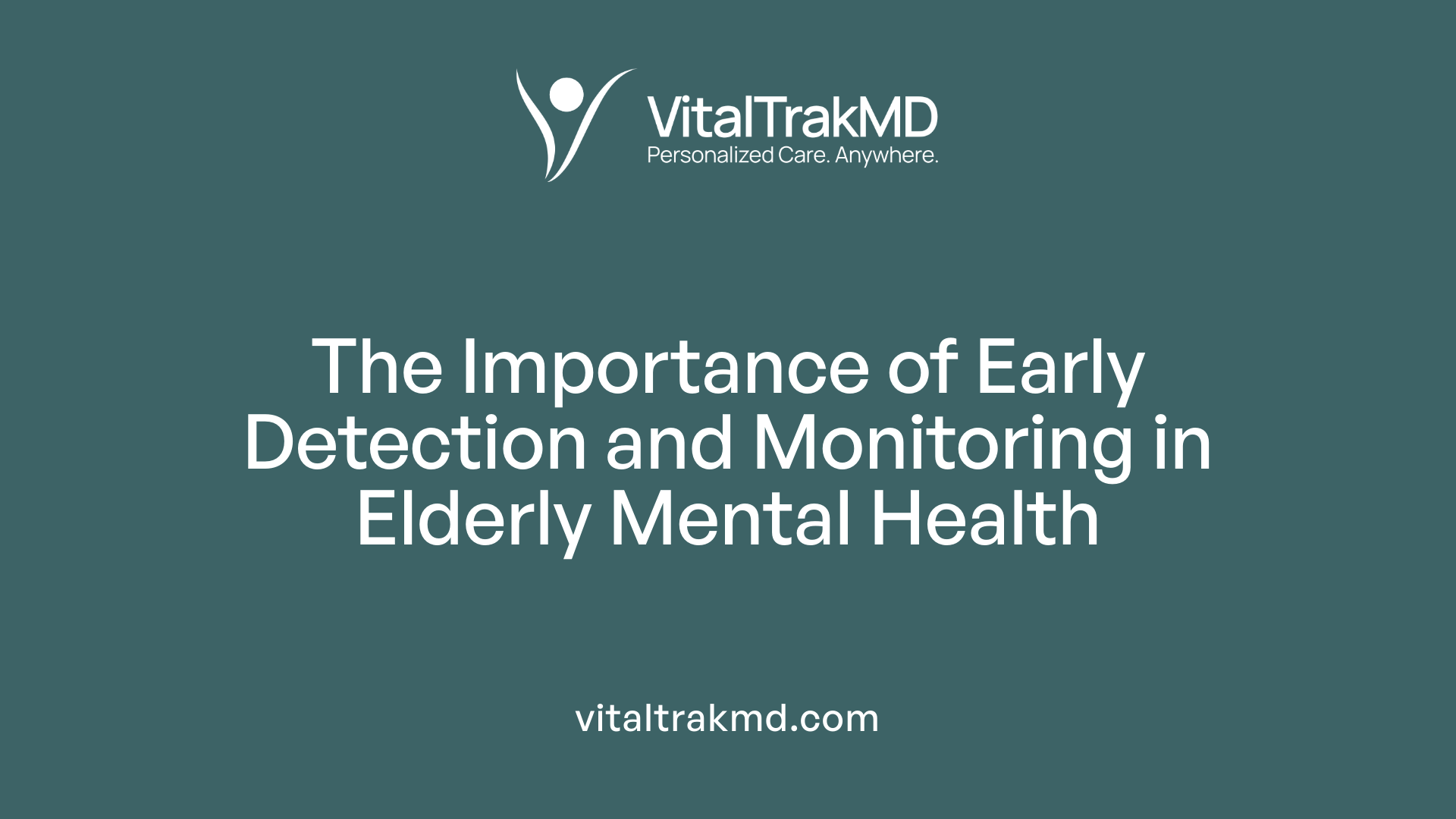
Why is mental health awareness and early detection important in elderly populations?
Mental health awareness and early detection are vital for aging populations because mental health conditions such as depression, anxiety, and cognitive disorders often become more prominent or unnoticed as people age. Recognizing these conditions early can lead to timely and effective treatment, which significantly improves overall well-being and quality of life.
Many older adults experience subtle changes in mood, behavior, or physical health that can signal underlying mental health issues. Symptoms like social withdrawal, fatigue, irritability, or memory problems are often mistaken for normal aging, leading to underdiagnosis. However, these signs may be early indicators of serious conditions like depression, anxiety, or dementia.
Early identification allows healthcare providers to intervene sooner, employing therapies such as cognitive-behavioral therapy (CBT), medication, social engagement activities, or lifestyle modifications. This proactive approach not only alleviates psychological symptoms but can also prevent or slow cognitive decline and related disabilities.
Older adults face increased risks from social isolation, grief, chronic physical illnesses, and experiences of abuse, all of which can worsen mental health problems if left unrecognized. The stigma and misinformation surrounding mental health in seniors can further hinder early detection.
Implementing regular screening and increasing mental health awareness among caregivers, clinicians, and seniors themselves can bridge these gaps. Routine screenings during primary care visits can help identify at-risk individuals before symptoms become severe.
Overall, heightened awareness and early detection in elderly populations provide a pathway to personalized treatment plans. They promote resilience, support aging healthily, and reduce the societal and personal burdens of untreated mental health conditions.
This proactive approach is essential for fostering dignity, independence, and the emotional well-being of older adults, ultimately supporting healthier aging in our communities.
Strategies and Practices for Supporting Mental Well-being in Seniors
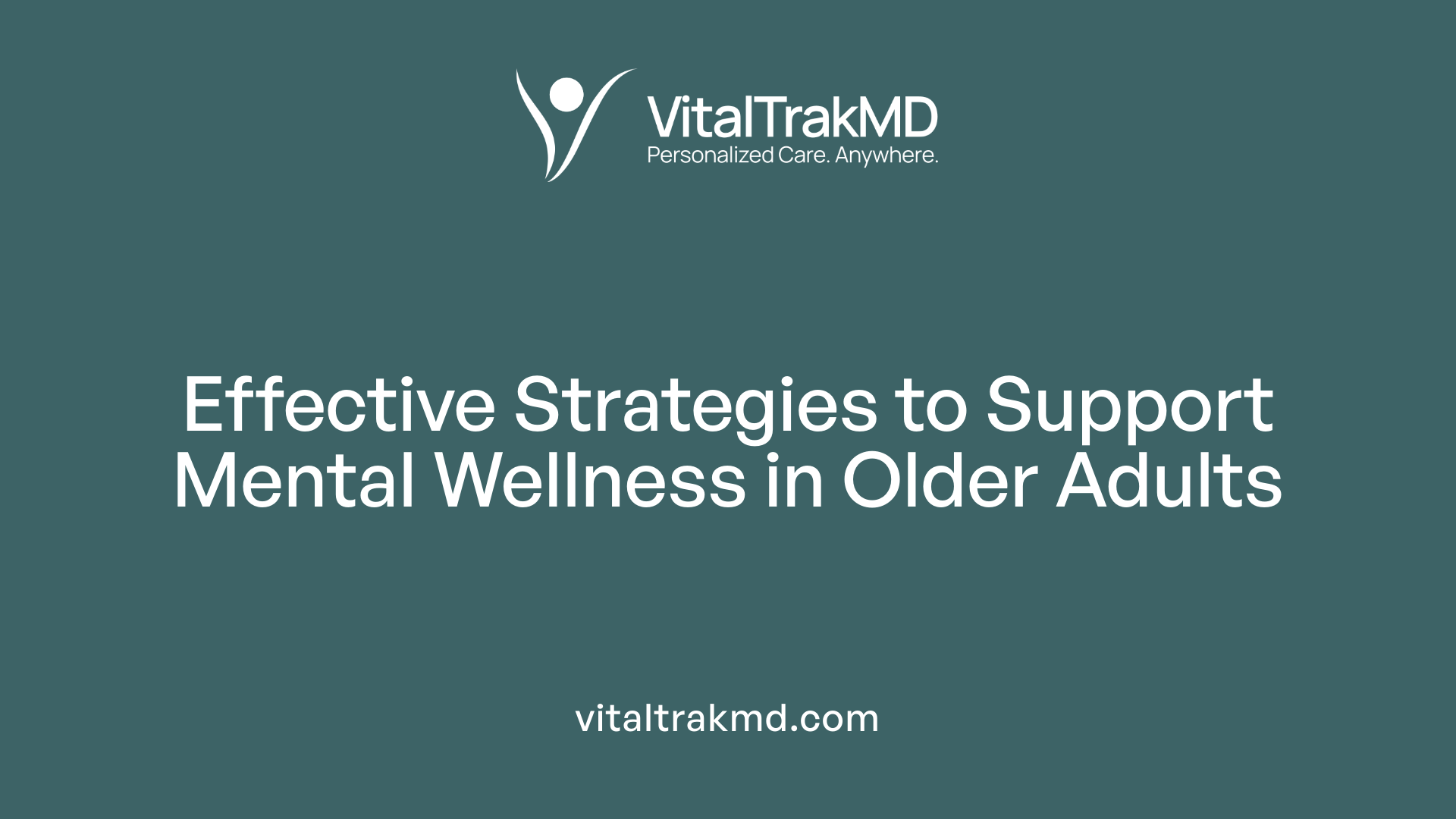
What strategies and practices are effective for supporting mental health among older adults?
Supporting mental health in older adults requires a multifaceted approach that addresses social, behavioral, medical, and societal factors. One core strategy involves promoting social engagement and community participation. Activities such as arts and crafts, exercise classes, book clubs, social outings, and volunteering help foster social connections.
Technological solutions, like video calls and social media platforms, can also reduce feelings of loneliness and social isolation, which are significant risk factors for mental health conditions.
In addition, encouraging healthy lifestyle habits is vital. Regular physical activity, such as walking, swimming, or yoga, improves strength, flexibility, balance, and releases mood-boosting endorphins. A balanced diet rich in fruits, vegetables, nuts, and lean proteins supports overall well-being. Good sleep hygiene and stress management techniques—including meditation, hobbies, and social interactions—contribute to emotional stability.
Early detection and prompt treatment of mental health issues are crucial. Community-based, integrated mental health services—combining screening, psychotherapy, medication, and support for conditions like depression and dementia—are the most effective.
Programs implementing collaborative care models, measurement-based care, and expansion of telepsychiatry improve access and tailor treatment to individual needs. These models facilitate coordinated efforts between primary care providers and mental health specialists, making care more accessible and reducing stigma.
Addressing societal attitudes by reducing ageism and promoting positive perceptions of aging can combat stereotypes and foster environments that nurture mental health. Policies that ensure safe housing, social support, and financial security further contribute to mental wellness.
Overall, adopting a comprehensive strategy that incorporates social activities, healthy lifestyle promotion, early intervention, integrated care frameworks, and societal change creates the foundation for supporting mental health in older adults.
| Aspect | Approach | Details |
|---|---|---|
| Social Engagement | Community & technology | Art classes, social groups, online chats |
| Lifestyle Interventions | Physical activity | Walking, yoga, strength exercises |
| Diet | Nutrient-rich foods and hydration | |
| Stress management | Meditation, hobbies, social outings | |
| Healthcare Services | Screening & early diagnosis | Regular check-ups for mental health signs |
| Integrated care | Collaborative models like measurement-based care | |
| Policy & Society | Anti-ageism & supportive policies | Promoting positive aging, safe environments |
Implementing these strategies collectively enhances mental health, cognitive resilience, and overall quality of life in the senior population.
Methods and Resources to Enhance Mental Health Care in Senior Settings
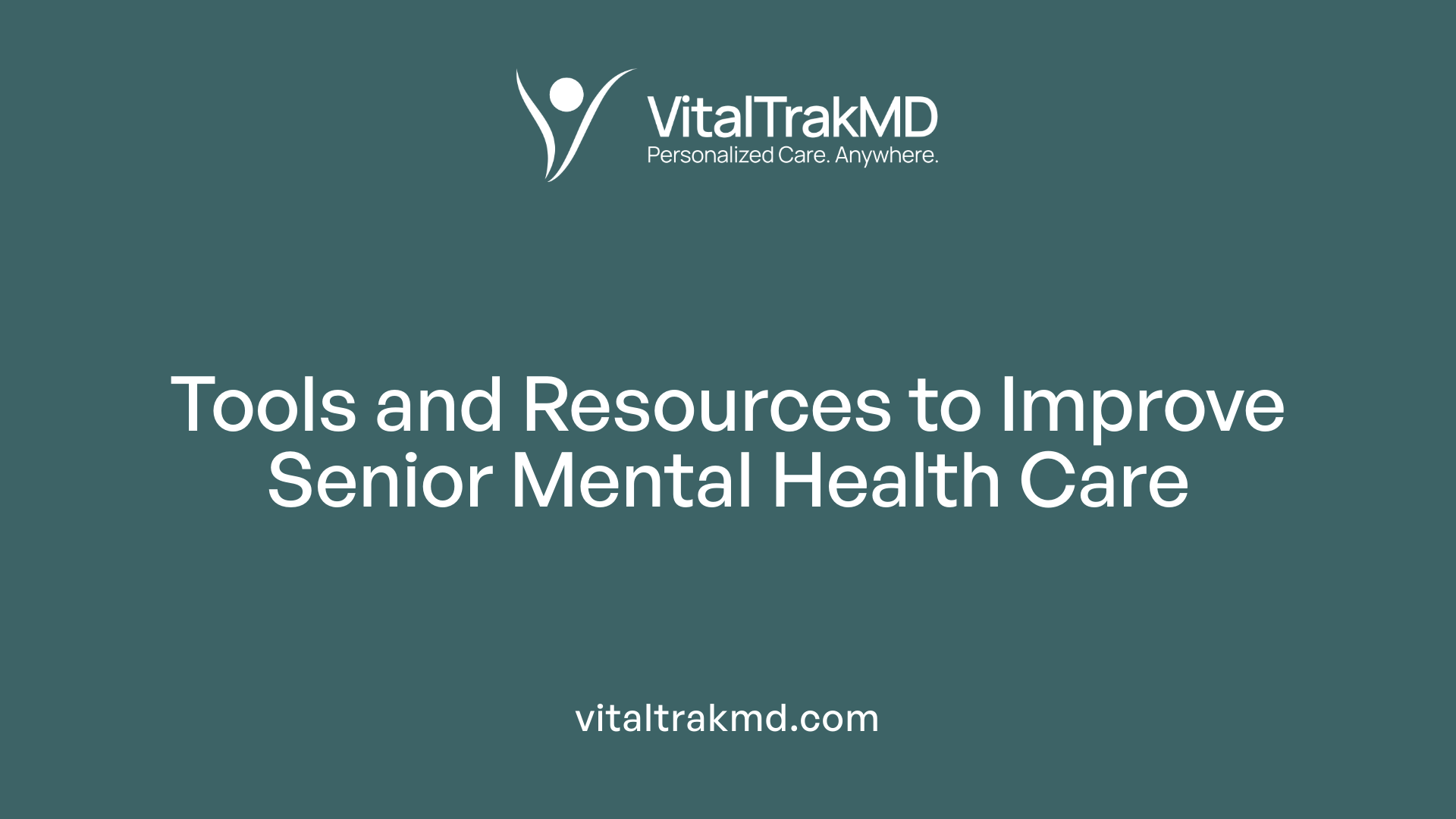
What methods and resources are available to support mental health in senior care settings?
Supporting the mental well-being of older adults involves a combination of proactive screening, tailored interventions, and accessible resources. Regular mental health screening tools facilitate early detection of conditions like depression, anxiety, and cognitive decline. Instruments such as the Geriatric Depression Scale (GDS) and the Mini-Mental State Examination (MMSE) are widely used to identify issues promptly.
Early recognition of symptoms is crucial, especially since mental health issues in seniors often present atypically, such as physical complaints or irritability rather than typical emotional symptoms. Training healthcare providers and caregivers to recognize subtle signs can lead to timely interventions.
To complement assessment, a variety of resources are available. Telehealth services enable remote mental health consultations, making specialized care accessible even in rural or underserved areas. Digital platforms and apps offer tools for self-monitoring mood and activity levels, fostering an increased understanding of health trends.
Support programs like peer support groups, the Friendship Line, and crisis hotlines such as CalHOPE provide immediate emotional support. The 988 Lifeline, recently rebranded, is also available for urgent mental health crises nationwide.
Several organizations contribute to improving mental health in older populations. The Substance Abuse and Mental Health Services Administration (SAMHSA), the Administration on Aging, and the National Institute of Mental Health (NIMH) supply guidelines, training modules, and educational materials tailored for elder care providers.
Integrating lifestyle modifications along with clinical interventions enhances mental health outcomes. Ensuring proper nutrition, encouraging physical activity, and managing sensory impairments like hearing loss help sustain cognitive and emotional resilience.
How can screening tools and early detection methods improve mental health outcomes?
Screening instruments are essential for catching mental health issues early, especially considering seniors often underreport symptoms due to stigma or lack of awareness. Validated tools like the Geriatric Depression Scale (GDS), PHQ-9, and anxiety questionnaires assist in identifying those who need further evaluation or treatment.
Early detection facilitates prompt, personalized care, potentially preventing the progression of disorders like depression or dementia. Routine screening during regular check-ups ensures continuous monitoring.
What role does telehealth and digital resources play in senior mental health care?
Telehealth programs break down geographic and mobility barriers, allowing older adults to consult mental health professionals from their homes. Video-based therapy sessions, mental health apps, and remote monitoring tools support ongoing care and can be integrated into regular health management.
Digital resources also provide educational content, coping strategies, and stress reduction exercises tailored for seniors. These tools empower older adults with self-management skills and foster better communication with their healthcare team.
How do support programs, crisis hotlines, and professional organizations contribute to mental health?
Support programs like peer groups, community engagement initiatives, and wellness classes help build social connections, which are vital for mental health. Crisis hotlines like the 988 Lifeline and CalHOPE offer immediate assistance for those experiencing acute distress.
Professional organizations—such as SAMHSA and the National Institute of Mental Health—offer webinars, guidelines, and training programs to equip providers and caregivers with best practices.
Partnerships between healthcare providers and mental health organizations facilitate comprehensive care, ensuring older adults can access timely help and ongoing support. Emphasizing a community-centered approach reinforces a safety net for seniors facing mental health challenges.
| Resource Type | Examples | Purpose |
|---|---|---|
| Screening Tools | GDS, MMSE, PHQ-9 | Early detection and assessment |
| Telehealth Platforms | Teladoc, Amwell, MDLIVE | Remote diagnosis and therapy |
| Crisis Hotlines | 988 Lifeline, CalHOPE, Friendship Line | Immediate crisis support |
| Support Programs | Peer support, community centers | Social engagement and emotional support |
| Professional Organizations | SAMHSA, NIMH, Administration on Aging | Guidelines, training, resources |
Addressing mental health in older adults requires a multifaceted approach, combining early detection, accessible digital tools, community support, and professional guidance. By leveraging these methods and resources, senior care settings can create a supportive environment that promotes mental resilience and enhances quality of life for aging populations.
Integrating Mental Health Screening into Senior Wellness Programs
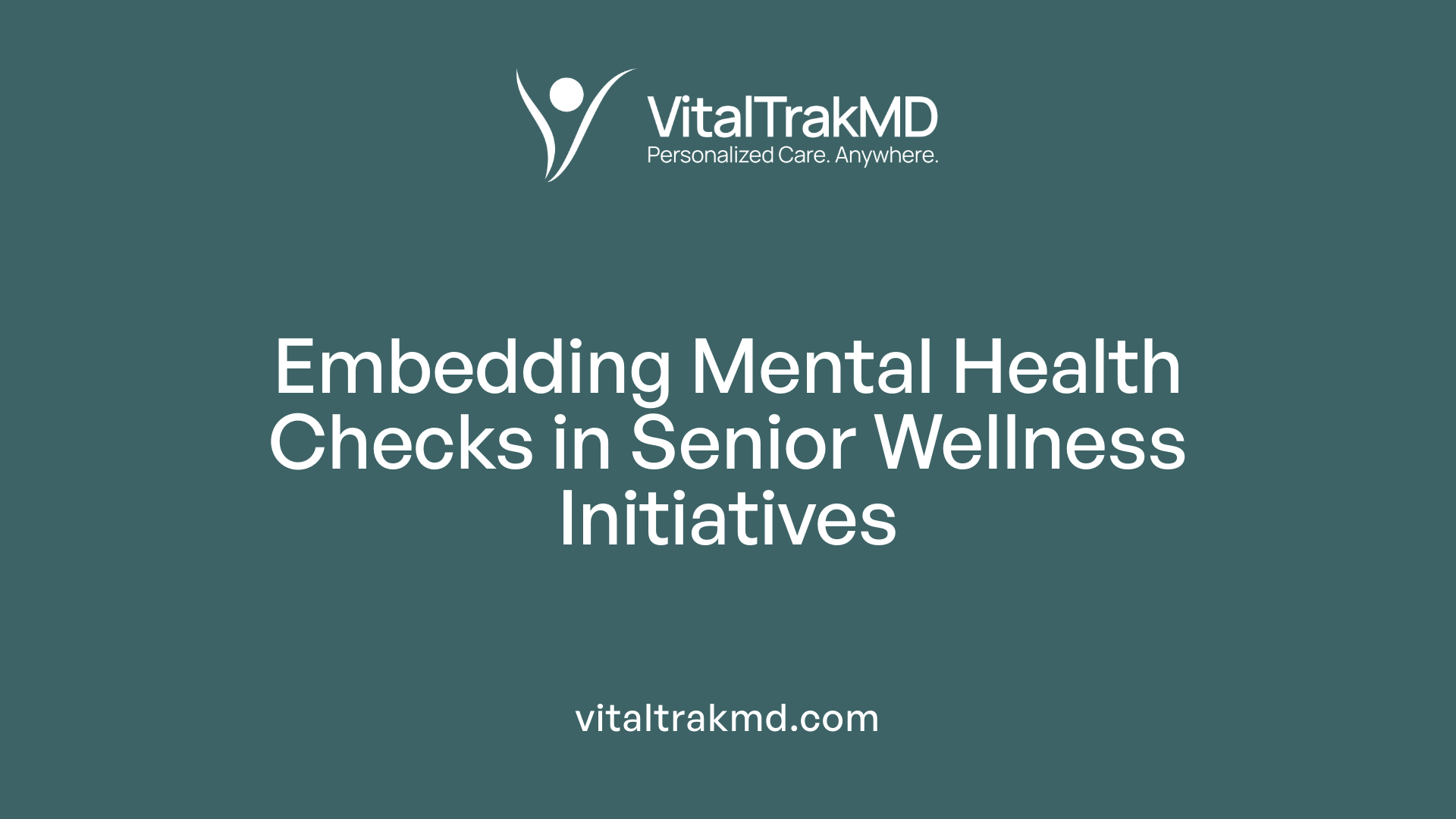
How can mental health screening be integrated into senior wellness programs?
Incorporating mental health assessments into routine senior health care is essential for early detection and intervention. One effective approach involves using validated, brief screening tools such as the Geriatric Depression Scale (GDS), Patient Health Questionnaire (PHQ-9), or the BS4MI-elderly during standard check-ups or wellness visits.
Healthcare providers, including primary care physicians, nurses, social workers, and community health workers, should be trained to administer, interpret, and respond to these screening results. Proper training ensures that potential mental health issues like depression, anxiety, or cognitive decline are identified promptly.
The use of digital and telehealth platforms can expand screening reach, allowing for easier access especially for homebound or remote seniors. Online or app-based assessments can be integrated into telemedicine visits, enabling consistent monitoring without the need for physical clinic visits.
Regular screening should be followed by thorough assessments when necessary, with referrals to mental health specialists such as psychologists, psychiatrists, or counseling services. Coordination with social and community programs enhances support networks, ensuring that seniors receive comprehensive care.
Embedding mental health screening into existing wellness programs, including annual health exams or community health initiatives, normalizes mental health checks and reduces stigma. This proactive approach fosters a holistic view of health, emphasizing that mental well-being is equally important as physical health.
Overall, standardizing mental health assessments in senior health care promotes early intervention, improves life quality, and helps destigmatize mental health issues among older adults.
Addressing Barriers and Enhancing Access to Mental Health Care for Seniors
What are the barriers to mental health care for seniors, and how can access be improved?
Older adults face numerous obstacles when seeking mental health care, which can significantly impact their well-being. Systemic barriers include limited funding for mental health services, long wait times, and shortages of providers specialized in geriatric mental health. These issues often result in inadequate or delayed care.
Stigma and ageism also play a major role. Many seniors hold false beliefs about aging and mental health, leading to reluctance in seeking help and feeling ashamed or misunderstood. Additionally, social factors such as loneliness and social isolation reduce the likelihood of recognizing or prioritizing mental health issues.
Financial constraints can limit access, especially for those on fixed incomes, preventing them from affording care or transportation to health facilities. Moreover, healthcare systems often treat physical and mental health separately, creating gaps in comprehensive care for older adults.
Addressing these barriers necessitates a multifaceted approach. Implementation of integrated, multidisciplinary care models—where primary care providers collaborate with mental health specialists—can enhance continuity and accessibility of services. Promoting the use of telehealth technology offers promising potential to reach seniors in remote or underserved areas, providing greater convenience and reducing stigma associated with mental health visits.
Community outreach programs aimed at raising awareness about mental health, reducing stigma, and encouraging social engagement are crucial. These initiatives can help normalize mental health discussions and motivate seniors to seek support early.
Policy reforms are essential to increase funding dedicated to geriatric mental health services and expand training programs for healthcare providers. Developing specialized training to equip providers with skills to address unique physical, cognitive, and emotional needs of older adults improves care quality.
Furthermore, addressing social determinants such as loneliness through programs that promote social participation and community involvement can indirectly improve mental health outcomes. Activities like art clubs, exercise groups, and volunteer opportunities foster social connection and a sense of purpose.
In summary, improving mental health care access for older adults requires combining systemic policy changes with innovative service delivery models and community engagement. By reducing barriers and fostering a supportive environment, we can ensure that seniors receive the appropriate mental health support they need to maintain quality of life.
Prioritizing Mental Health Monitoring for a Fuller, Healthier Aging
In summary, mental health monitoring is an essential, yet often overlooked, component of senior wellness. Addressing common mental health issues with early detection, deploying effective strategies, and expanding resources can significantly enhance the quality of life for older adults. Overcoming systemic barriers and reducing stigma through awareness and policy changes are vital to ensuring equitable access to care. As populations age globally, integrating comprehensive mental health support into routine senior care isn’t just beneficial — it’s imperative to promote dignified, healthy aging for all.
References
- Mental health care for older adults: recent advances and new ...
- Older Adults Are Being Overlooked When it Comes to Mental Heath ...
- Mental Health Awareness Month: Staying on Top of Mental Wellness ...
- [PDF] Supporting the Mental Health Needs of Older Adults | SAMHSA
- Addressing Senior Mental Health in Primary Care Services
- Mental Health Awareness Month, Supporting Older Adults' Mental ...
- Mental health of older adults - World Health Organization (WHO)
- Mental Health Practices for Elderly: Key Strategies
Recent articles
Want to Feel Better and Live Healthier?
Join hundreds of patients taking control of their health with personalized care that fits their life – not the other way around.
Rated 4.8/5 by 32+ customers







